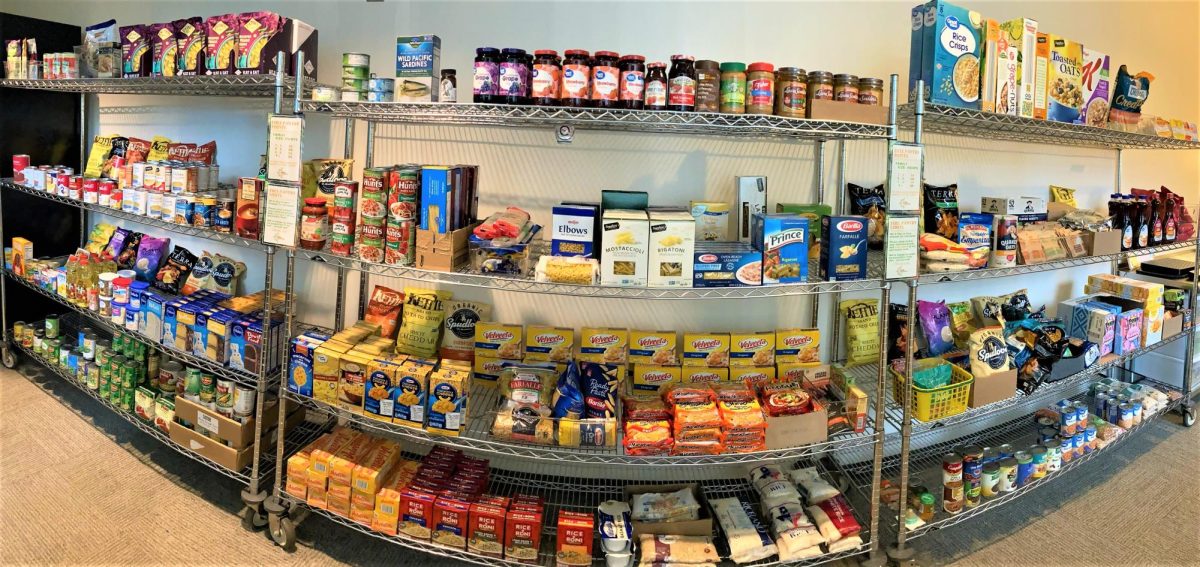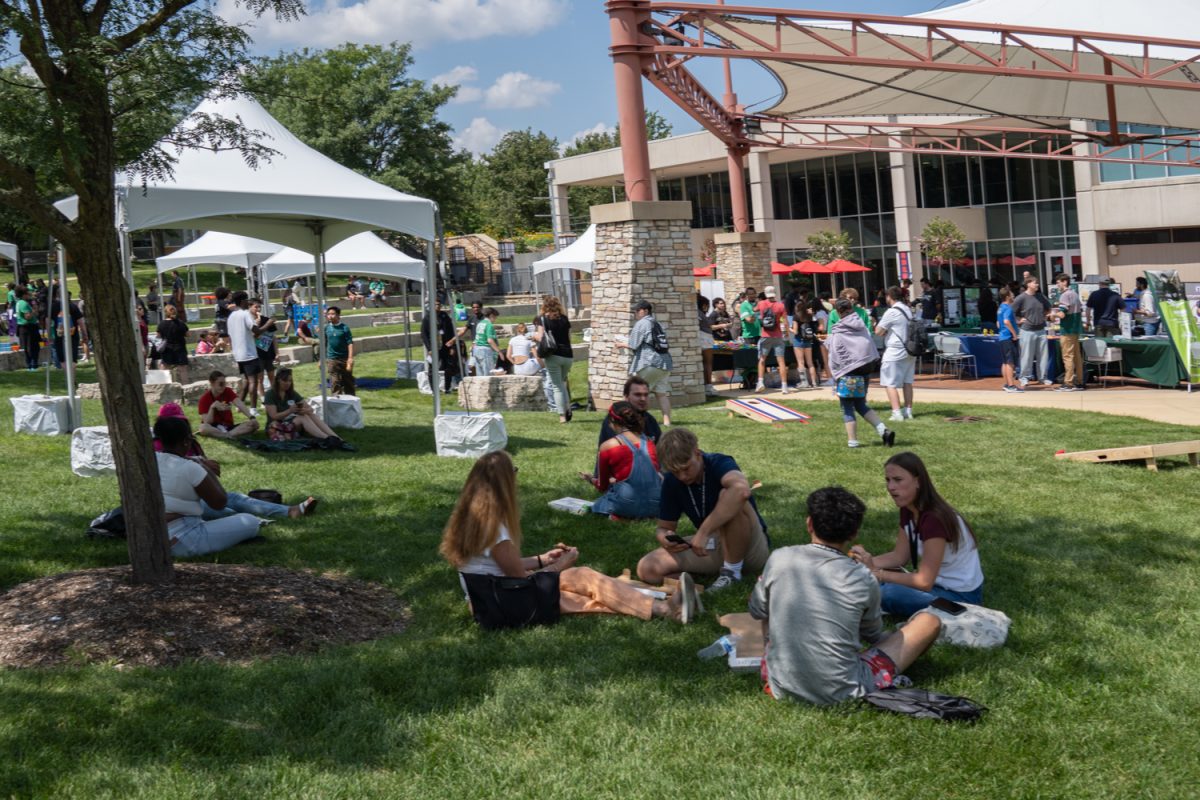Editor’s Note: This article uses an anonymous source. The pseudonym of “Anna Morgan” is used in place of the source’s name. This has been done at the request of the individual. The reason for anonymity is to protect the individual’s privacy outside of the context of this article. The writer and editors know the identity of the source.
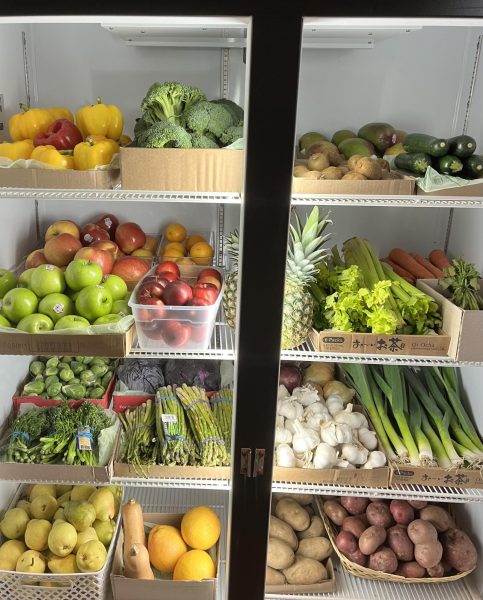
Food insecurity for college students is a widespread and well-known problem, as the subject of many research studies and “broke college meal” Tiktok videos. This is why the Fuel Pantry was created by students in 2016 and continues to be an active campus resource involving many clients, volunteers and donors.
The Pantry offers a variety of food options through donations, including hot meals from the cafeteria, Subway, and coffee shop. There are also freshly-cooked lunches made by the culinary school’s student chefs, such as potato soup and seafood stew. The Pantry fridges are stocked with fruits and vegetables, some grown in the Fuel Garden.
In July, the Pantry provided 1,453 pounds of free food and toiletries. The total for 2023 from January to July was 11,227 pounds, valued at over $21,556, which is a remarkable cost-saving for clients.
The abundant food choices and a welcoming atmosphere are two essential features that clients love about the Pantry. One such client is Elisabeth Pribulick, who is currently doing a Human Services 3+1 bachelor’s degree. She has been using the Pantry since the spring of 2023 and discussed how she navigates to the Pantry when using her scooter, due to having ataxic cerebral palsy.
“I go to the Pantry once a week, and sometimes I stop by between classes to grab a snack or a salad if I wasn’t able to bring lunch,” Pribulick stated. “The location is right next to the bookstore. I take the glass elevator to go right down to the bottom. It’s [the Pantry’s] big enough for when I have my little scooter. I get through there fine, but if anybody had anything larger than my little, tiny scooter, it wouldn’t be big enough. For now, before we’re able to enlarge the Pantry, there’s plenty of help from Linda and the staff volunteers.”
Pribulick described why she began to attend COD in her adult life and how her life circumstances led to using the Fuel Pantry’s services.
“I live with my daughter, and I am a widow. My husband died nine years ago. I also have a physical challenge, ataxic cerebral palsy, so my physical circumstances are what they are,” Pribulick explained. “I had been working at a job, but with the pandemic, I decided I need to make a life change and go back to school to focus on my own goals. By opening a new chapter, I unfortunately also reduced my income. I’m very grateful for the help the Fuel Pantry gives, so I can keep focused on my education. The food from a weekly pickup lasts about a week, and Linda says to come as often as you need.”
Linda Kozlowski is the Fuel Pantry Manager since the start of this year. She has decades of non-profit management experience to lead the Fuel Pantry with a knowing hand. Kozlowski described how the Pantry’s food services are structured.
“Our Pantry is teeny-tiny, but we try very hard to have a variety of items and make it welcoming to all,” Kozlowski explained. “We also have a Grab & Go rack that provides a quick snack to any student, even if they’re not a Pantry client. It’s our way of reaching out to everyone, saying ‘hi’ and helping them feel comfortable stopping inside the Pantry if they do need it in the future.”
Clients of the Fuel Pantry use a weekly points system, where each item is one point. A client gets a certain number of points, based on family size. This system is designed to be generous, so even a single person can take around 30 items of their choice.
“We work hard to destigmatize the Pantry and present it as just another resource for students, similar to the library or financial aid,” Kozlowski said. “We encourage people to use the Pantry by making registration easy and not asking for financial information as many other pantries do. It’s a self-identified need and often a need that comes and goes with clients. For example, some of our clients have long-term food insecurity and visit us every week. Others visit occasionally when an unexpected car repair bill or other crisis happens, and they need just a bit of help.”
Pribulick discussed how it’s very appreciated by clients to see Kozlowski’s efforts to collect donations to benefit those who may be struggling in the COD community.
“Linda is extremely motivated and a fearless force who’s fighting for students and faculty to succeed,” Pribulick said. “She’s going to come knocking on doors for donations, so my suggestion is when you see her coming, just say ‘Yes, ma’am, how can I help?’ Because she’s coming after you to take care of you.”
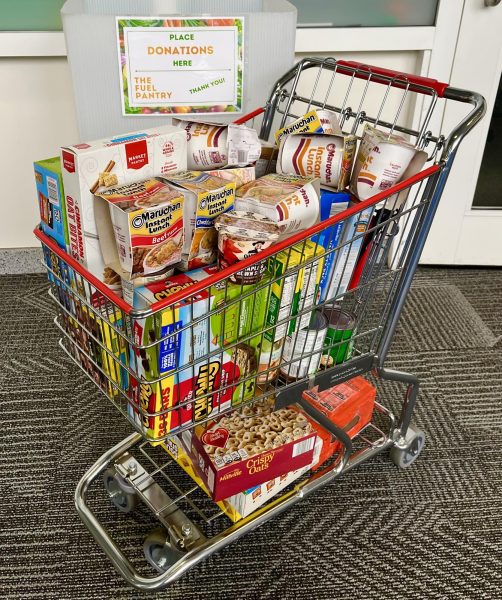
Another client also shared her experiences under a pseudonym. Anna Morgan goes to the Pantry once a week, usually before classes and after doctor’s appointments. She even began to volunteer at the Pantry, organizing donated food items, during each visit.
“What I appreciate the most is the added thought that going to the Pantry removes from my mind,” Morgan said. “I have two dependent family members and fell on hard times related to my health. When my ability to work was compromised and my focus became 100% on health, I stumbled upon the Fuel Pantry and began using its resources.”
Morgan stated that she is grateful for the flexibility the Pantry has offered her.
“Having regular access to the resources that the Pantry offers has allowed me to focus on my health and re-entering the workforce from a leave of absence by removing some of the mental exertion and stress that would be spent otherwise on ensuring my family and I have enough, meal planning and food shopping,” she said.
Morgan described why the larger COD community should not worry about stigma when seeking the Pantry’s services.
“If they have a genuine need taking away from their health or studies, they should not feel any stigma choosing to take care of themselves and move forward,” Morgan said. “Many students may have little access to transportation to get to stores for purchasing these goods, or they may not have the extra funds to regularly stock their food supplies as they fund their college education. By enabling access to these basic needs in a convenient location for students, the students are then free to focus on their education and career, and ideally excel to where they do not need services like the Pantry’s.”
Pribulick also mentioned why it’s essential to remove the stigma of needing the Fuel Pantry.
“The food pantry helps us stay focused on the future,” Pribulick said. “We just use it while we are forwarding ourselves, our education. A lot of people feel like it’s handouts, it’s not. We’re the COD family. We help everyone get to the next step without judgment. Don’t get bogged down by your life situations, realize that COD is there to support students in their entirety.”
Pribulick also described her own personal goals that she hopes to achieve through earning her Human Services degree, a goal that is furthered through the support the Fuel Pantry provides her.
“I’m going to be an advocate for people. I’m learning to be a voice for people who may not be to speak for themselves, so they can be empowered,” Pribulick stated. “People are using the food pantry as a stepping stone while we’re at school. Using it to empower ourselves to move forward so that we’ll be able to give back to our community and ourselves in the near future.”
Severe food insecurity can deteriorate physical health, cause anxiety and disrupt academic goals. The Hope Center for College, Community and Justice at Temple University fielded a country-wide #RealCollege Survey. They published their report from 2020, where over 195,000 students from 202 colleges responded. They found 39% of students are food insecure because they don’t have enough money for food when also paying hefty college tuition.
That is why donations are important. This summer, the COD Paralegal Club partnered up with the Fuel Pantry for a focused donation effort from students and faculty, which they hope to continue in the coming years. Paralegal Club Charitable Outreach Officer Kate Manser described why this is such an important development.
“It is important to recognize that we are all one community here at College of DuPage and no student should have to worry about when their next meal will be,” Manser said.
Fuel Pantry donation boxes were installed in the Paralegal Program classroom, BIC 3461 and BIC 1441. Students and professors dropped off food as they came in for classes. In just two weeks, from July 5 to 18, the Paralegal program donations amounted to 81 pounds of food items and 20 items of non-food donations. By the end of July, there were overall 130 pounds of donated items.
One of the program’s leading faculty is long-time professor and club adviser Linda Jenkins. She often organizes the volunteer events the program participates in annually, such as the DuPage County Bar Association’s winter clothes drives.
“Charitable outreach has been vitally important to the Paralegal Club since we became a club many years ago,” Jenkins described. “All of this shows Paralegal Club’s strong commitment to volunteering and to giving back to those in need. I am very proud to be part of a group that finds joy in helping others. Nothing could be more rewarding than making a difference in people’s lives.”
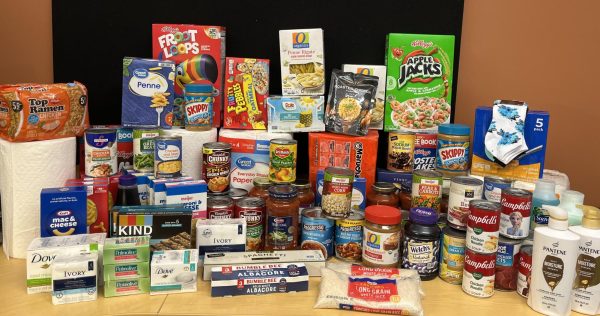
Pribulick echoed the importance of donations and appreciation for donors.
“I think it’s amazing to have people donate, look past their own needs, and help their fellow students,” Pribulick stated. “That’s another thing that COD does well, it helps to be community-minded. Use the food Pantry if you need it. If you’re blessed with food and don’t need it, please Donate what you can.”
People can monetarily support the Pantry on the COD Foundation website. Kozlowski said actual food donations are highly needed, as well as Pantry volunteers. Students from other clubs are encouraged to also donate to the Fuel Pantry like the Paralegal program is doing.
“To continue our funding, I track everything that is donated in, and then everything that is given back out to clients, by weight. It might be fun to see how many pounds of food your group was able to contribute over time,” Kozlowski encouraged.
Both the Fuel Pantry, SRC 1000, and the Student Life Office, SSC 1217, have permanent bins so that students can drop off their food donations anytime. Visit the Fuel Pantry website to sign up as a client, donate food, or volunteer.



